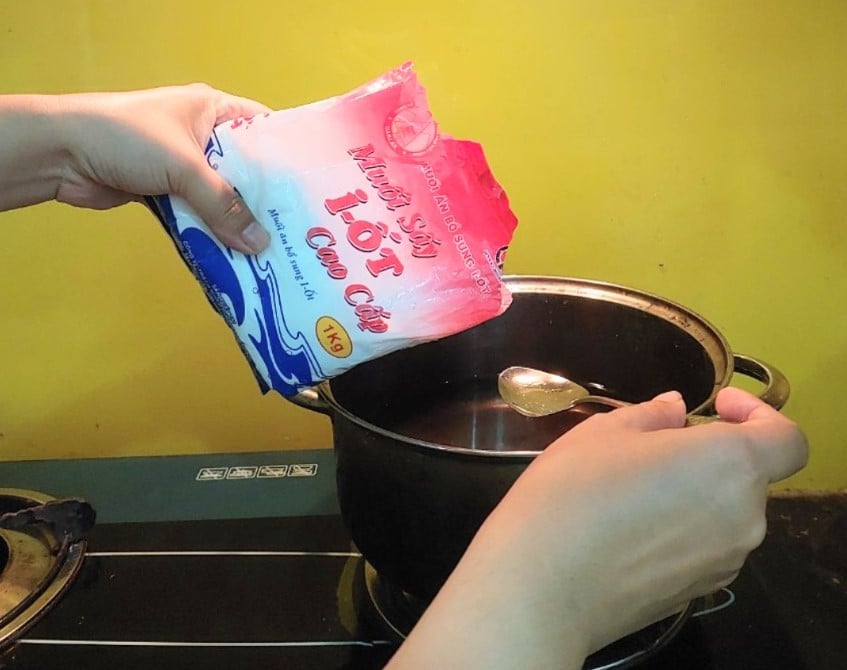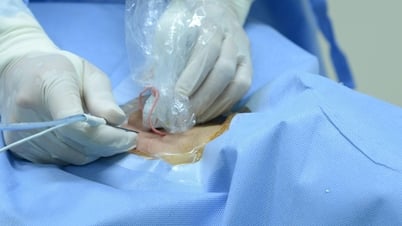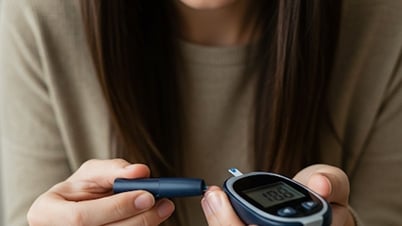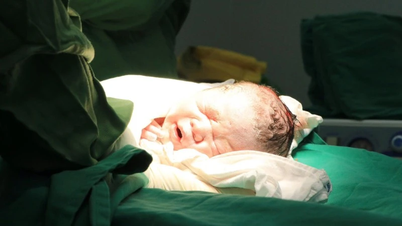On November 7, the Ministry of Health informed that "the arguments lacking scientific basis and evidence of some individuals and businesses in recent times have caused public confusion, negatively affecting the efforts of the health sector in preventing and combating iodine deficiency disorders; at the same time, they go against the Party's guidelines and policies and the State's laws."

Iodine deficiency causes thyroid disease (illustrative photo).
The Ministry of Health affirmed that "there are no concerns related to the public's use of iodized salt, including iodized salt used in households and in food processing. In Vietnam, there has never been a case of people having excess iodine."
According to the report of the Central Endocrinology Hospital and the Institute of Nutrition, Vietnam has not yet recorded any cases of patients with excess iodine. The results of the 2019-2020 Nutrition Survey show that, in all groups of subjects, the median urinary iodine level is lower than the recommendation (specific data in the current situation section). The proportion of people with urinary iodine concentration exceeding the threshold of 300 ppm is 0% (threshold > 300 ppm is the threshold of high urinary iodine). With this result, it is affirmed that the Vietnamese population still does not reach the recommended daily iodine intake. To date, there has been no medical literature mentioning the program of using iodized salt for the whole population (from 1994 to present) leading to consequences of thyroid disease.
Iodine deficiency itself or high iodine causing thyroid diseases are also classified as consequences of iodine deficiency, this is the WHO classification. In areas of severe iodine deficiency will cause increased rates of hyperthyroidism in autoimmune thyroid nodules and in people with subclinical hyperthyroidism when iodine supplementation is performed.
According to WHO, after 5-10 years of regular iodine supplementation, the incidence of hyperthyroidism will decrease, corresponding to areas without iodine deficiency. Hyperthyroidism is an autoimmune disease, mainly treated with synthetic antithyroid drugs. If medical treatment fails or immune factors remain high after a long period of medical treatment, surgery or radiation therapy should be chosen.
In Vietnam, according to Globocan 2020 data, as well as the world situation, thyroid cancer ranks 10th in the number of new cases, 6th in women in terms of new incidence rate among all types of cancer, 4 times higher than in men. The cause of cancer increase is due to the development of technology and awareness of people for early detection. There is no scientific document confirming that excess iodine causes thyroid cancer.
Previously, the Association and Food Association had opinions and recommendations regarding the use of iodine-fortified salt that changes color, taste or has negative effects on consumers' health. However, the Ministry of Health has not received any scientific evidence from businesses regarding the use of iodine-fortified salt that changes color, taste or has negative effects on consumers' health.
Source: https://www.baogiaothong.vn/thuong-xuyen-dung-muoi-i-ot-co-nguy-co-cuong-giap-khong-192241107154735802.htm


![[Photo] President Luong Cuong receives President of the Cuban National Assembly Esteban Lazo Hernandez](https://vphoto.vietnam.vn/thumb/1200x675/vietnam/resource/IMAGE/2025/9/30/4d38932911c24f6ea1936252bd5427fa)

![[Photo] Solemn opening of the 12th Military Party Congress for the 2025-2030 term](https://vphoto.vietnam.vn/thumb/1200x675/vietnam/resource/IMAGE/2025/9/30/2cd383b3130d41a1a4b5ace0d5eb989d)
![[Photo] Panorama of the cable-stayed bridge, the final bottleneck of the Ben Luc-Long Thanh expressway](https://vphoto.vietnam.vn/thumb/1200x675/vietnam/resource/IMAGE/2025/9/30/391fdf21025541d6b2f092e49a17243f)
![[Photo] General Secretary To Lam, Secretary of the Central Military Commission attends the 12th Party Congress of the Army](https://vphoto.vietnam.vn/thumb/1200x675/vietnam/resource/IMAGE/2025/9/30/9b63aaa37ddb472ead84e3870a8ae825)
![[Photo] The 1st Congress of Phu Tho Provincial Party Committee, term 2025-2030](https://vphoto.vietnam.vn/thumb/1200x675/vietnam/resource/IMAGE/2025/9/30/1507da06216649bba8a1ce6251816820)































































































Comment (0)